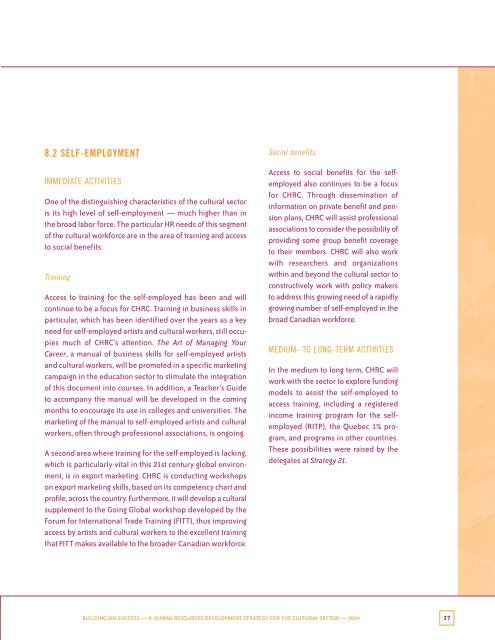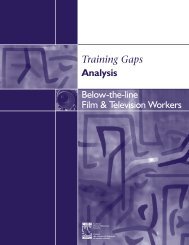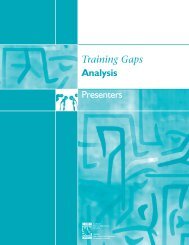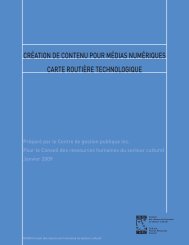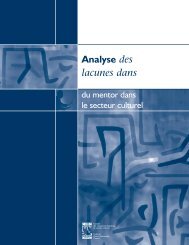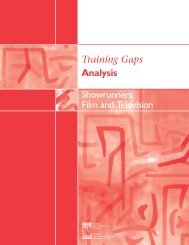Full document
Full document
Full document
You also want an ePaper? Increase the reach of your titles
YUMPU automatically turns print PDFs into web optimized ePapers that Google loves.
8.2 SELF-EMPLOYMENT<br />
IMMEDIATE ACTIVITIES<br />
One of the distinguishing characteristics of the cultural sector<br />
is its high level of self-employment — much higher than in<br />
the broad labor force. The particular HR needs of this segment<br />
of the cultural workforce are in the area of training and access<br />
to social benefits.<br />
Training<br />
Access to training for the self-employed has been and will<br />
continue to be a focus for CHRC. Training in business skills in<br />
particular, which has been identified over the years as a key<br />
need for self-employed artists and cultural workers, still occupies<br />
much of CHRC’s attention. The Art of Managing Your<br />
Career, a manual of business skills for self-employed artists<br />
and cultural workers, will be promoted in a specific marketing<br />
campaign in the education sector to stimulate the integration<br />
of this <strong>document</strong> into courses. In addition, a Teacher’s Guide<br />
to accompany the manual will be developed in the coming<br />
months to encourage its use in colleges and universities. The<br />
marketing of the manual to self-employed artists and cultural<br />
workers, often through professional associations, is ongoing.<br />
A second area where training for the self employed is lacking,<br />
which is particularly vital in this 21st century global environment,<br />
is in export marketing. CHRC is conducting workshops<br />
on export marketing skills, based on its competency chart and<br />
profile, across the country. Furthermore, it will develop a cultural<br />
supplement to the Going Global workshop developed by the<br />
Forum for International Trade Training (FITT), thus improving<br />
access by artists and cultural workers to the excellent training<br />
that FITT makes available to the broader Canadian workforce.<br />
Social benefits<br />
Access to social benefits for the selfemployed<br />
also continues to be a focus<br />
for CHRC. Through dissemination of<br />
information on private benefit and pension<br />
plans, CHRC will assist professional<br />
associations to consider the possibility of<br />
providing some group benefit coverage<br />
to their members. CHRC will also work<br />
with researchers and organizations<br />
within and beyond the cultural sector to<br />
constructively work with policy makers<br />
to address this growing need of a rapidly<br />
growing number of self-employed in the<br />
broad Canadian workforce.<br />
MEDIUM- TO LONG-TERM ACTIVITIES<br />
In the medium to long term, CHRC will<br />
work with the sector to explore funding<br />
models to assist the self-employed to<br />
access training, including a registered<br />
income training program for the selfemployed<br />
(RITP), the Quebec 1% program,<br />
and programs in other countries.<br />
These possibilities were raised by the<br />
delegates at Strategy 21.<br />
BUILDING ON SUCCESS — A HUMAN RESOURCES DEVELOPMENT STRATEGY FOR THE CULTURAL SECTOR — 2004 37


